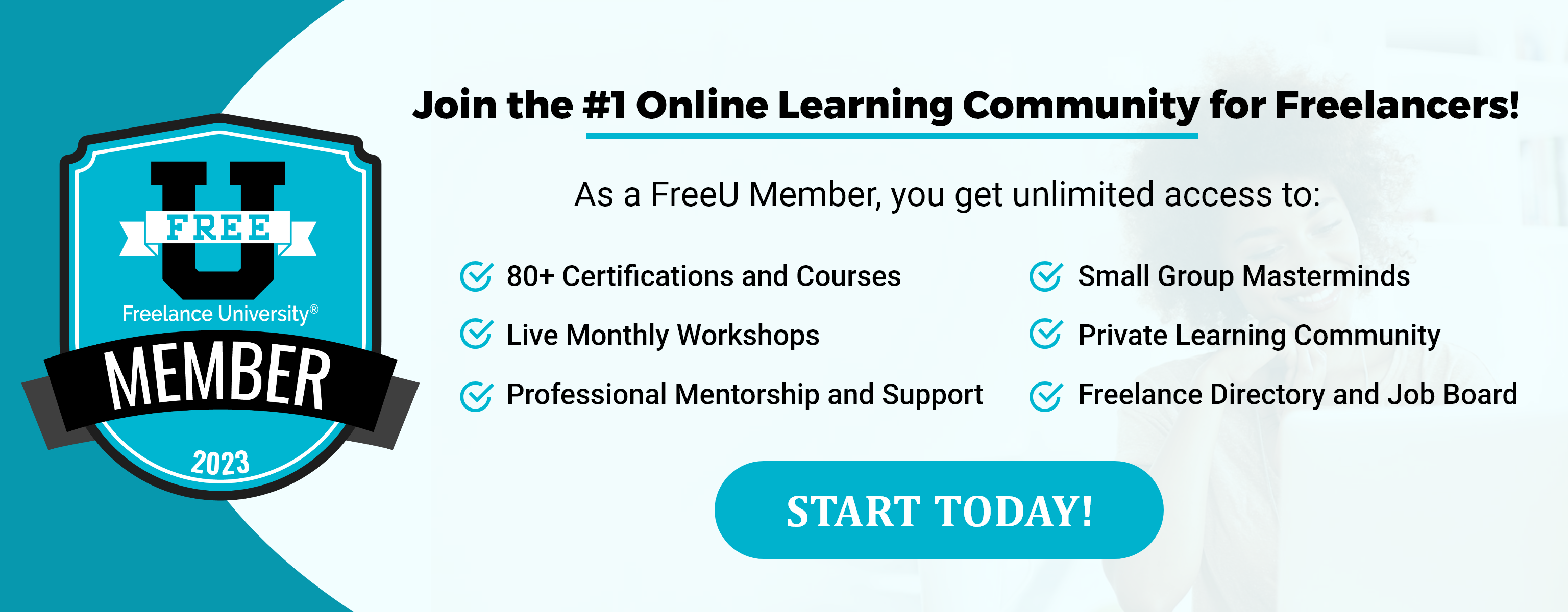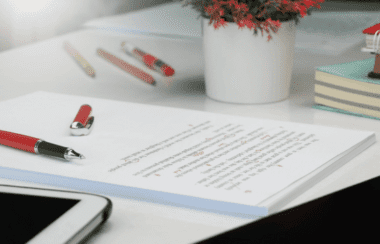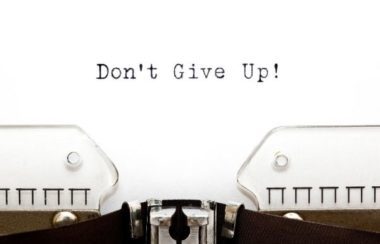How to Take Time Off in Your Freelance Business!
By Jena Kroeker
As I write this post on how to take time off in your freelance business, many people in my area are looking forward to summer vacation. Kids are out of school, and families are getting ready for camping adventures and trips to the lake. Have I planned a holiday too, you may ask?
No way! Are you kidding? Take time off from work to sit at a lake?
If you’re like me, you may have adopted a work ethic early in life that said holidays were bad for business. When I was a high school and university student, I would study hard throughout the year, sacrificing leisure time for good grades. But I was saved by the prescribed rhythm of work and rest created by reading breaks, spring breaks, long weekends, and summer holidays. When the school took time off, I did.
As a freelancer, we are our own boss. We have the freedom to work when we want, and sometimes we think that has to be all the time. Often, work doesn’t stop unless we tell it to. So, before we start strategizing how to take time off, many of us may need to convince ourselves that it’s okay to go on vacation.
Benefits of Taking Time Off
Think about the last time you truly unplugged and took an extended break. How did you feel? It may have been hard to switch gears and get back into work mode when you returned, but did you feel somewhat refreshed?
Now think about times when you slogged through week after week without a break. I’ve sometimes worked seven days a week, maybe not for full eight-hour days, but without a full day of rest. When that happens, I start to get tired and irritable, lacking creativity and enthusiasm.
In an article titled “Why taking a rest day is essential for freelancers,” Shirin McArthur illustrates the wisdom of a day of rest:
“There’s an old religious concept about time off that carries ancient wisdom with it. It’s the idea of a sabbath day. ‘Sabbath’ refers to a day of rest, when no work is done. Traditionally, that day has been either Saturday or Sunday.
It was time for family, for relaxed conversation, for hanging out on the front porch and watching the world go by.”
Regarding her own schedule, McArthur says that she notices her efficiency and her “capacity to handle the unexpected” deteriorates without a day off. She finds that resting for a day makes a difference in her “level of energy and commitment for the rest of the week.”
Chloe Brooks shares some more eye-opening thoughts in her article, “The Freelancer’s Guide to Taking Time Off.” She references a Business Insider article that says Medieval peasants took more time off than the average American worker does now, and she suggests that freelancers take even less time off than average American workers.
She warns, “Long-term, that kind of schedule wreaks havoc on your productivity, your health (both physical and mental), and eventually, your client relationships. Not giving yourself time off can lead to fatigue, lost motivation, and burnout.”
But can freelancers really take holidays? Our FreeU Technology Mentor, Theresa Scholes, is an example of a virtual professional who recently planned and enjoyed a month-long trip. When I asked her what the biggest benefit and the biggest challenge of taking a long vacation was, she said,
“Vacations help refresh your perspective and remind you to enjoy life. As a freelancer, the biggest challenge is making sure your clients are on side with your choice; when you come home you want the first email from them to say, ‘Welcome back – I missed you!’”
Theresa’s excellent communication and planning helped her clients transition during her vacation time. When she returned, all of us on the team certainly said, “Welcome back – we missed you!”
Strategies for Taking Short and Long Holidays
1. Plan, plan, plan.
In the article above, Chloe Brooks suggests considering vacation and sick days when you calculate your rate. By building downtime in when you set your rates, you can give yourself time to recharge. She also advises giving yourself a few mental health days. She says,
“Now add up all of that time and subtract it from the 52 weeks in a year. That result is the number of weeks you can reasonably expect to work, and that’s what you’ll use to calculate your hourly rate.”
This way, you’re giving yourself permission to take time off. Some holidays may present themselves through family commitments and invitations to events. But the key is to avoid last-minute trips as much as possible. As Jen Hubley Luckwaldt says in her article, “How to Take Vacation When You’re a Freelancer,” it’s okay to spontaneously take a long weekend now and then, but one- and two-week breaks should be planned as far in advance as possible.
In my virtual business, I try to keep my content calendar updated, and I plan one or two days off around project due dates, making sure my clients are cared for. I arrange out-of-town family visits around these due dates too. In your own work, decide whether you can plan holidays around your schedule or whether you need to carve out those holidays.
2. Communicate well.
One of the keys to taking time off as a freelancer is to communicate well with clients and team members. When Theresa was planning her holiday, she let our team know a month in advance and then reminded us again before she left. She took care of her clients and didn’t leave them high and dry.
When I first started freelancing, I didn’t communicate well about my holidays. I once notified my client over the phone that I was going to the States. I confused them, and when I came home, they had stopped sending me work. When I asked them, they said they thought I had moved to the States and had forgotten about me.
Many articles suggest certain intervals for reminding clients about when you’ll be going on holidays. You may want to initially remind them one month ahead of time, then two weeks ahead of time, then one week, then one or two days. I would suggest tailoring your reminders to your client and how they like to communicate. Decide what will help them most remember what’s happening and how often they need to hear it from you.
3. Decide if you need someone to take over your workload.
Instead of pausing your workload, another option is to have someone fill in for you. You could find a fellow freelancer in your niche who could work with clients in your absence. In an article titled “Yes, You Can Take a Vacation as a Freelancer,” Sophie McAulay warns, “Just make sure that you handover properly and are not compromising on quality – only refer to another freelancer friend if you know they’re going to offer your clients the same standard you’d produce.”
Am I the only one whose first thought is, “But what if my client gets used to the sub and likes them better than they like me?” 🙂 Silence those thoughts, because finding a good substitute for yourself is an important way of caring for your clients. In a recent fitness class I took, one of my favorite instructors booked a fantastic sub to take her place in her absence. It made me love her class more, because I knew I’d be in good hands even if she was away.
4. Develop good productivity habits at home.
Another way to take time off is to make good use of the time we have at home. Productivity frees us up to do more with our days. In a previous Freelance University blog post, “Your Guide to Optimizing Your Daily Productivity,” we quote the Calvin and Hobbes comic strip by Bill Watterson: “There’s never enough time to do all the nothing you want.” And then we discuss strategies to make it possible to do some of “the nothing you want” by freeing up time that might otherwise be wasted.
Here are some tips to keep in mind:
• Limit your distractions while working.
• Focus on one task at a time.
• Silence notifications and check email and social media messages at regular intervals.
• Use time tracking software and Pomodoro timers like Toggl.
• Use software and apps like RescueTime to optimize your efficiency.
How to Have a Successful “Work-cation”
A work-cation? Is that when your family has fun by the pool while you sit by yourself all day, working in the hotel room? Well, that’s one way to look at it, but it doesn’t have to be. With good productivity habits and clear boundaries, you can do work-cations well and come home refreshed and relaxed.
Sometimes, out of choice or necessity, we may decide to bring work with us on a trip. If that’s the case, here are some tips to reduce stress and balance work with play:
Back up all your information before you leave.
Courtney Symons has some wise advice in her article, “A Freelancer’s Guide to Taking a Vacation.” She recommends backing up your phone and computer before you leave, saying, “I speak from experience. I once dropped my cell phone in the ocean as my hand trembled from the sheer excitement of being about to set foot on a tropical island.”
So, prepare for the unexpected, and make sure you won’t be losing valuable files or technology while you’re away. Also, be sure to securely store your devices and papers while you’re out enjoying yourself.
Be clear about when you’ll communicate with clients and team members.
While you’re away, the last thing you need is to be sitting on a roller coaster at an amusement park while your client sends you urgent messages. The article above has some further recommendations for working vacations:
“To set expectations, and to leave you with time for a siesta or two, pick a time block during which you will consistently be available while you’re on vacation. Aim for two hours, or less per day. Let your clients and colleagues know that they can reach you within that timeframe, and that timeframe only (unless it’s a legitimate emergency).”
Find a productive workspace.
A good way to maintain productivity while on a work-cation is to find a dedicated workspace where you can focus. When you’re booking your vacation, try to find a hotel that has a business centre or coworking space for professionals. Another option is to scout out a nearby coffee shop or library with reliable Wi-Fi. Better yet, have your family or fellow travellers meet you outside the door at a certain time so you’re sure to clock off and leave work behind.
Final Thoughts
These are just a few strategies to help you take time off in your freelance or virtual assistant business. As Theresa Scholes says, “Vacations help refresh your perspective and remind you to enjoy life.” Far from hurting your business, time off will enhance your services and relationships with your clients. Your refreshed perspective and enjoyment of life will benefit both your personal and professional life.
And now we’d love to hear from you! What are some tips you have for taking time off in your virtual business? What are some challenges you face? Please share your thoughts in the comments below.









































































































